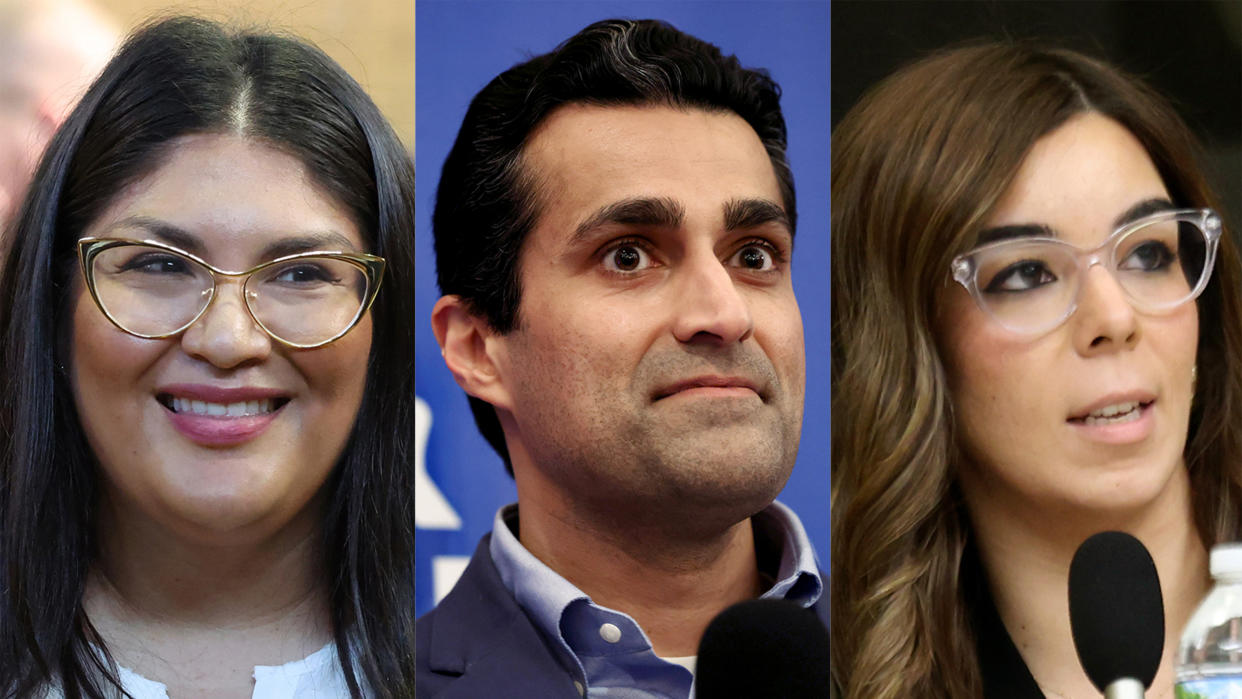General Assembly races test clout of Democrat leaders

- Oops!Something went wrong.Please try again later.
- Oops!Something went wrong.Please try again later.
Two Democratic primaries for seats in the Illinois General Assembly featured races testing the political influence of House Speaker Emanuel “Chris” Welch and Senate President Don Harmon, with one defeating a House veteran and the other supporting a Senate newcomer who lost, according to unofficial results.
Without having to worry about losing their supermajorities in the fall’s general election, both Democratic leaders made heavy political and financial investments in two bare-knuckled legislative contests based in Chicago.
Welch, the state’s first Black speaker, put his reputation on the line as he took aim at the dean of the General Assembly — Rep. Mary Flowers, an African American South Sider who joined the House in 1985 as a fervent ally of Harold Washington, Chicago’s first Black mayor.
Flowers fell to Welch-backed challenger Michael Crawford, a campus official of The Chicago School, a private college, according to The Associated Press.
In a statement, Welch congratulated Crawford, saying Crawford met with residents and “spoke to the issues that unite us as Democrats and won their support.”
Flowers only conceded “that it took a million and a half dollars to defeat me.”
“I gave it my best shot, and the money has spoken,” Flowers said, lamenting how the money spent to defeat her could have been used to help schools and seniors instead.
Crawford’s campaign did not return calls.
Harmon, in contrast, sought unsuccessfully to defend appointed incumbent Sen. Natalie Toro in a Northwest Side contest for the seat in which she replaced former Sen. Cristina Pacione-Zayas, who stepped down last year to work as Mayor Brandon Johnson’s deputy chief of staff.
Toro lost to Graciela Guzman, a former legislative staffer for Pacione-Zayas and an organizer for the Chicago Teachers Union, which delivered Johnson’s mayoral victory, according to the AP.
Guzman declared victory, saying voters “sent a clear message that can be heard across Chicago and all of Illinois: We will not settle for anything less than real, bold, progressive leadership.”
Toro conceded defeat in a statement and wished Guzman the best.
Without offering remarks about specific races, a Harmon spokesman said the “most important voices tonight are those of the candidates who worked hard for months to earn the support of Democratic primary voters.”
Democrats, who hold a 78-40 majority in the House and a 40-19 advantage in the Senate, are in no danger of losing control of either chamber in November’s general election.
But wins in the primary intramural battles in Chicago’s Democratic stronghold are tantamount to local district victories in November, similar to intraparty Republican primary contests in deep conservative pockets of central and southern Illinois.
The biggest question hanging in the Flowers and Toro races was whether money would influence the races. Far outpacing the Flowers fundraising, the Welch-backed effort saw more than $1.5 million in donations to Crawford.
Nearly $600,000 of that total came from Welch and other House Democratic allies, records show. Flowers’ name recognition could not overcome the speaker and his allies pouring in big money.
The rarity of Welch’s move to go all out against an incumbent Democrat is of particular note because, all in all, Flowers’ track record is one of a veteran Democrat who took many tough votes over her decadeslong career.
It is a far different dynamic from ex-Speaker Michael Madigan’s successful effort in 2016 to knock off then-Rep. Ken Dunkin, a Chicago Democrat who had sided with Republican Gov. Bruce Rauner on key votes.
In a prior interview with the Tribune, Flowers’ central argument for reelection was that she has the institutional wisdom of nearly four decades in lawmaking and that there is a “generation of people that I helped” in the communities she’s represented.
In the Senate, two other losing candidates in the Toro-Guzman race were Dr. Dave Nayak, who runs a free asthma and allergy clinic in Chicago’s Roscoe Village neighborhood, and Geary Yonker, a community organizer who has also worked as a media executive.
Toro was appointed to Pacione-Zayas’ Senate seat through a process run by Democratic Party insiders.
In recent months, Toro collected more than $1.8 million from Harmon-related Democratic political committees alone, records showed.
But Guzman, with support from Cook County Board President Toni Preckwinkle, the county Democratic Party chair, and U.S. Sen. Bernie Sanders, the former Democratic presidential candidate from Vermont, also received hundreds of thousands of dollars, including from teacher-related unions.
Nayak mostly bankrolled his campaign, loaning his political fund about $800,000, records showed.
In November, Guzman will face Republican Jason Proctor, who ran unopposed in the GOP primary.
In another Democratic legislative primary race in Chicago, Rep. Theresa Mah, the first Asian American elected to the General Assembly, staved off a challenge from Lai Ching Ng, according to the AP.
The winner will face Republican Natalian Bolton, who ran unopposed in the GOP primary.
In the race to replace veteran Democratic Rep. Kelly Burke of Evergreen Park, who is stepping down, the AP declared Evergreen Park attorney Rick Ryan the winner over Sonia Khalil, who conceded.
The winner will face Republican Christine Shanahan McGovern of Oak Lawn, the lone GOP primary candidate.
In the western suburbs, the AP called Democratic Rep. Matt Hanson the Democratic primary winner over Arad Boxenbaum, who conceded. He also lost to Hanson in 2022.
The race represented the first for Hanson since he pleaded guilty late last year to drunken driving.
“I’m grateful for the voters,” he said.
Farther south, incumbent Democratic Sen. Patrick Joyce of Reddick declared victory over challenger Kimberly Earling of Braidwood. Earling could not be reached for comment. Republican Philip Nagel ran unopposed in the GOP primary.
Joyce hailed his campaign and government teams saying, “People notice, and it pays off.”
Chicago Tribune’s Ray Long contributed.

